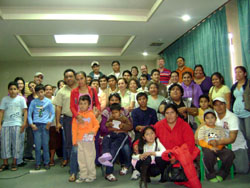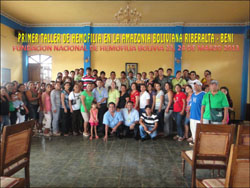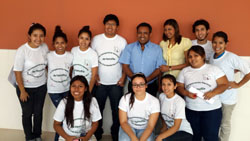HoG Twinning: We Live in Deeds
Horizons in Hemophilia, October 2015
By Deniece Chevannes, Director of Health Promotion & Evaluation
September 10, 2015 is a date to mark in the HoG history archives. Why? Because on that day the government of Bolivia announced that it would provide free factor to children diagnosed with hemophilia in Bolivia. HoG has been working with Fundación Nacional de Hemophilia Bolivia (FUNAHEB) on a World Federation of Hemophilia (WFH) twinning project since 2011. The goal of this twinning is to improve care for people in Bolivia affected by inherited bleeding disorders.
 I will never forget visiting the hospitals in Santa Cruz on August 5, 2011. Jeff Cornett, Vice President of Research & Public Policy, and I were in Bolivia to assess if HoG and FUNAHEB could partner to bring about change in Bolivia. That Friday as we toured the medical facilities, we saw patients sitting on sidewalks outside of the hospital because there were no indoor waiting rooms. Inside the hospital we saw rebar sticking out of walls, bed sheets used as doors for treatment rooms, rusted exam beds and equipment. It all added up to unsanitary medical conditions and a national public health infrastructure in crisis. That day I thought, it’s going to be hard to get the Bolivian Ministry of Health to focus on people with inherited bleeding disorders when they have an entire country in need of public health improvements.
I will never forget visiting the hospitals in Santa Cruz on August 5, 2011. Jeff Cornett, Vice President of Research & Public Policy, and I were in Bolivia to assess if HoG and FUNAHEB could partner to bring about change in Bolivia. That Friday as we toured the medical facilities, we saw patients sitting on sidewalks outside of the hospital because there were no indoor waiting rooms. Inside the hospital we saw rebar sticking out of walls, bed sheets used as doors for treatment rooms, rusted exam beds and equipment. It all added up to unsanitary medical conditions and a national public health infrastructure in crisis. That day I thought, it’s going to be hard to get the Bolivian Ministry of Health to focus on people with inherited bleeding disorders when they have an entire country in need of public health improvements.
However the next day, August 6, 2011, we met with families and people affected by bleeding disorders and I heard the stories mothers shared with us how they were sure that their children would not live long lives due to their bleeding disorder. I thought HoG has to twin with FUNAHEB and at the very least try to bring hope to these families.
A year later in 2012, with our twinning approved by the WFH, we worked with FUNAHEB on an advocacy campaign aimed at the Ministry of Health in Bolivia. That year we got our first victory; the Ministry of Health acknowledged that bleeding disorders existed and we began to have formal discussions on the needs of Bolivians affected by them. We were making progress!
 By the end of the next year, 2013, our twinning efforts were expanding across the entire country. Millie Rondon, HoG Office Manager, and I traveled to Bolivia and trained members of FUNAHEB on how to provide workshops, information and share knowledge on bleeding disorders. In one year our partners provided workshops for over 120 medical professionals and more than 220 people and families affected by inherited bleeding disorders.
By the end of the next year, 2013, our twinning efforts were expanding across the entire country. Millie Rondon, HoG Office Manager, and I traveled to Bolivia and trained members of FUNAHEB on how to provide workshops, information and share knowledge on bleeding disorders. In one year our partners provided workshops for over 120 medical professionals and more than 220 people and families affected by inherited bleeding disorders.
Three years into our twinning partnership in 2014, FUNAHEB had successfully worked to obtain a grant that provided lab equipment for two children’s hospitals i n Bolivia and would provide much needed diagnostic services for people suspected of having a bleeding disorder. That same year, September 10, 2014, Bolivia held its first camp for people affected by bleeding disorders.
n Bolivia and would provide much needed diagnostic services for people suspected of having a bleeding disorder. That same year, September 10, 2014, Bolivia held its first camp for people affected by bleeding disorders.
As we entered into the last year of our twinning partnership, the climate in Bolivia had really changed. Our partners at FUNAHEB were now fixtures at the Ministry of Health continuously advocating for improved conditions. FUNAHEB advocated so strongly and persistently the government declared April 17, 2015 as Hemophilia Day in Bolivia. This is of course World Hemophilia Day, but it had never been celebrated in Bolivia. Now the government was officially acknowledging this day. The cornerstone of our work with FUNAHEB has always been advocacy, so with this win under their belt our partners continued to advocate for an even bigger win: access to clotting factor.
Bolivia is one of many countries in the world that does not have factor available for people with hemophilia. The only factor Bolivia receives is the donated factor through the World Federation. Now our twinning partners were advocating for the Bolivian government to provide factor for people diagnosed with hemophilia. In a country where only four years ago the Ministry of Health did not acknowledge the existence of bleeding disorders, this was an ambitious goal. Yet our FUNAHEB partners were hopeful, passionate and steadfast in reaching their goal. On September 10, 2015 the Ministry of Health of Bolivia officially announced that it would provide free factor to children diagnosed with hemophilia in Bolivia!
Today, as I write this article on the journey that led us to that moment I am reminded of a poem by Phillip James Bailey. Bailey’s poem urges the reader to count life by heart beats and not time. The first line reads: “We live in deeds, not in years…” so as I recall the work and years of this twinning I will always remember the tears, smiles, and hours spent with the people of Bolivia advocating for better care and improving lives. I will remember the friends we made, the meals we shared and all deeds that led us to September 10, 2015.
